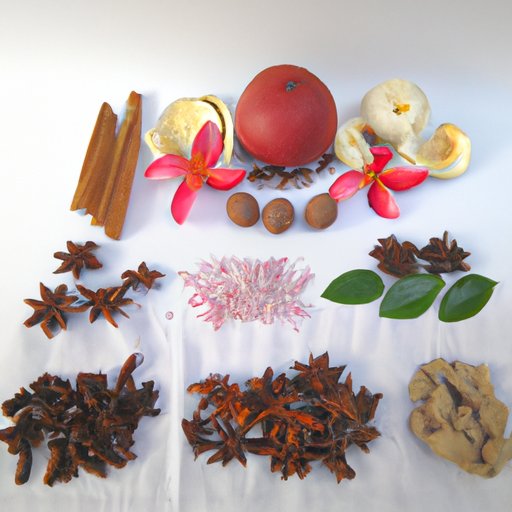Introduction
Smell is an important part of our daily lives. It helps us detect danger, enjoy food and experience pleasure. Unfortunately, a lot of people have lost their sense of smell due to various reasons such as allergies, sinus infections, colds, head injuries and more. But, don’t despair! There are some simple things you can do at home to regain your sense of smell.
Aromatherapy
Aromatherapy is a great way to stimulate the olfactory system and help you regain your sense of smell. Essential oils are known for their healing properties and can be used to improve your sense of smell. The aroma of essential oils can help clear congestion in the nose and open up your airways, allowing you to breathe more deeply and smell better.
Benefits of Aromatherapy
Aromatherapy can provide many benefits such as reducing stress, improving mood, and boosting energy levels. In addition, it can also help to improve your sense of smell by stimulating the olfactory system.
How to Use Essential Oils
Essential oils can be used in several ways, including: adding a few drops to a warm bath, diffusing them in an oil burner, or inhaling them directly from the bottle. You can also mix a few drops of essential oil with a carrier oil such as coconut oil, and apply it to your temples or chest.
Examples of Essential Oils
Some of the best essential oils for improving your sense of smell include peppermint, eucalyptus, lavender, tea tree, and lemon. Each of these oils has its own unique scent and therapeutic benefits. For example, peppermint is known for its invigorating effect while eucalyptus is known for its antibacterial and decongestant properties.
Stimulate Your Nose with Spices
Spices are another great way to stimulate your sense of smell. They contain volatile compounds that evaporate quickly when exposed to the air, releasing their aromas and stimulating the olfactory system.
Benefits of Spices
Using spices to stimulate your sense of smell can improve your overall wellbeing. The aroma of spices can help reduce stress and anxiety, boost your mood, and even improve your digestion.
How to Use Spices
You can use spices in a variety of ways. For example, you can add them to your food or drink, sprinkle them on top of dishes, or even just sniff them directly from the container. You can also try simmering a pot of water with a few drops of essential oil and some spices such as cinnamon, clove, and nutmeg.
Examples of Spices
Some of the best spices for stimulating your sense of smell include cinnamon, cloves, nutmeg, ginger, and cardamom. Each of these spices has its own unique scent and therapeutic benefits. For example, cinnamon is known for its calming effect while cloves are known for their antiseptic properties.

Eating Foods Rich in Vitamin A
Eating foods rich in vitamin A can also help to improve your sense of smell. Vitamin A is an essential nutrient that helps maintain healthy cells in the body, including those in the nose that are responsible for detecting odors.
Benefits of Eating Foods Rich in Vitamin A
Eating foods rich in vitamin A can help improve your sense of smell by strengthening the cells in the nose that detect odors. It can also help protect against certain diseases and improve your vision.
Examples of Foods Rich in Vitamin A
Some of the best foods for improving your sense of smell include carrots, sweet potatoes, spinach, kale, and cantaloupe. Each of these foods is packed with vitamin A and other vitamins and minerals that can help keep your body healthy.
Nasal Irrigation
Nasal irrigation is another great way to improve your sense of smell. This technique involves using a saline solution to flush out the nasal passages and remove any blockages or irritants that may be preventing you from smelling properly.
Benefits of Nasal Irrigation
Nasal irrigation can help to improve your sense of smell by clearing out any blockages or irritants in the nasal passages. It can also help to reduce inflammation, reduce congestion, and relieve sinus pressure.
How to Use Nasal Irrigation
Nasal irrigation can be done at home using a nasal irrigation device such as a neti pot or nasal rinse kit. To use, simply fill the device with a saline solution and tilt your head over the sink. Then, gently insert the nozzle into one nostril and allow the solution to flow through the other nostril. Repeat on the other side.
Yoga Poses
Yoga poses are another great way to stimulate your sense of smell. Certain yoga poses can help to improve circulation and increase blood flow to the nose, which can help to improve your sense of smell.
Benefits of Yoga Poses
Practicing yoga poses can help to improve your sense of smell by increasing blood flow to the nose. It can also help to reduce stress and anxiety, improve posture, and increase flexibility.
How to Use Yoga Poses
There are many different yoga poses you can practice to help improve your sense of smell. Some of the best poses include downward facing dog, bridge pose, and fish pose. Make sure to practice these poses slowly and mindfully, focusing on your breathing and making sure to keep your spine straight.
Conclusion
Losing your sense of smell can be a frustrating experience, but there are some simple things you can do at home to help improve it. Aromatherapy, spices, eating foods rich in vitamin A, nasal irrigation, and yoga poses are all great ways to stimulate your sense of smell and help you regain your sense of smell.


